The fear on Wall Street is rising to a fever pitch, as put option buyers recently accelerated their bets against the market while sentiment surveys reached levels of bearishness not seen since last October. As I’ve noted recently, fear is often the prelude to a tradable bounce. When fear runs high, it pays to follow the smart money, which is starting to flow back into stocks.
Fear is Reaching Extreme Levels
With so much fear among investors, stocks have now entered a familiar type of uncomfortable period; specifically, the type where even though the market is oversold, investors continue to fret and sell stocks in panic, as worries of higher interest rates continue to rise. The CBOE Put/Call ratio reading of 1.60 on 10/4/23 and the recent reading of 17 on the CNN Greed-Fear index are both bullish from a contrarian standpoint.
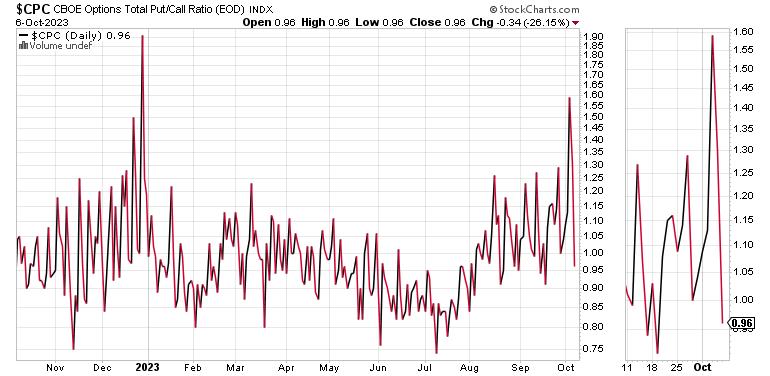
Of course, oversold markets can stay oversold for longer than anyone expects. Yet as long as the market does not make new lows, the odds of a tradable bottom building continue to rise. On the other hand, there is a light at the end of the proverbial tunnel, and that light is not an oncoming train. A sustained top and a subsequent retracement in bond yields will likely trigger a rebound in stocks.
Here’s the laundry list of worries:
- The Fed continues to push for higher interest rates;
- The market’s breadth has broken down; and
- Bond yields remain near multi-year highs.
Yet that may all change rather quickly, as the market’s breadth is showing signs of recovery and bond yields are looking a bit top-heavy. Moreover, it looks as if bargain hunters are moving into two key areas of the market.
Smart Money Sneaks into Tech Stocks
It wasn’t long ago that Wall Street realized that AI stocks had risen too far too fast, and we saw a breakdown in the entire technology sector. Yet, money is quietly moving back into many of the same stocks that broke down when the so-called “AI bubble” burst in August.
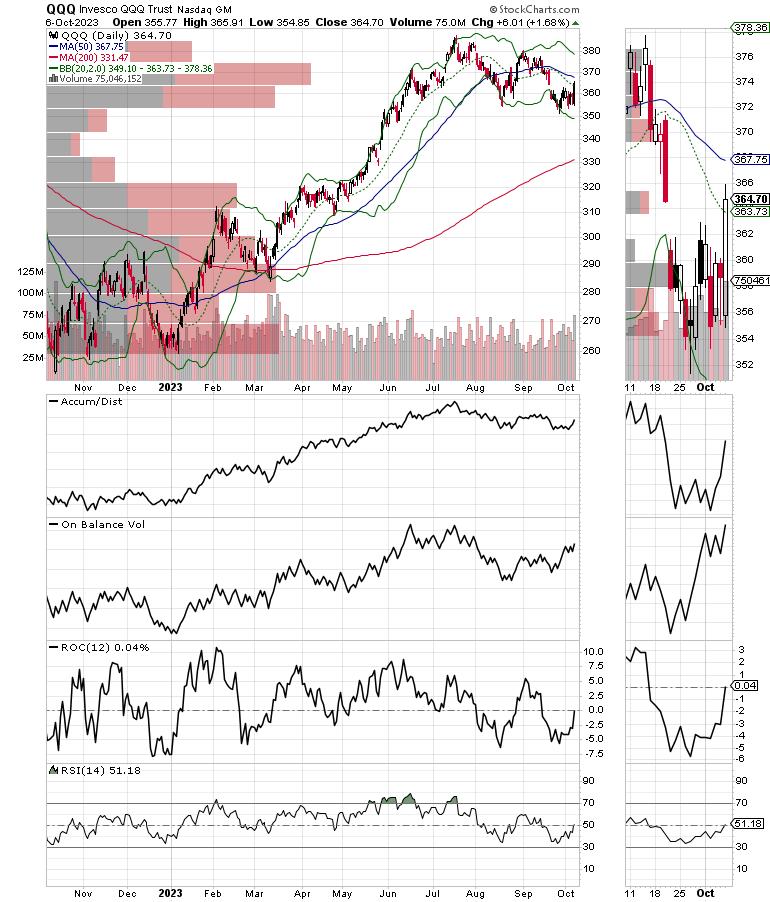
The Invesco QQQ Trust (QQQ) is heavily weighted toward a handful of large-cap tech stocks, including Microsoft (MSFT) and Alphabet (GOOGL). And while it’s still early in what could be a bumpy recovery for the market, given the Fed’s continuing talk of “higher for longer” interest rates, QQQ, which often bottoms out before the rest of the market, may have already made its lows for the current pullback. At this point, the $350 area seems to be decent support, while $370 is the key short-term resistance level. Accumulation/Distribution (ADI) and On Balance Volume (OBV) are both improving as short sellers leave (ADI) and buyers start moving in (OBV).
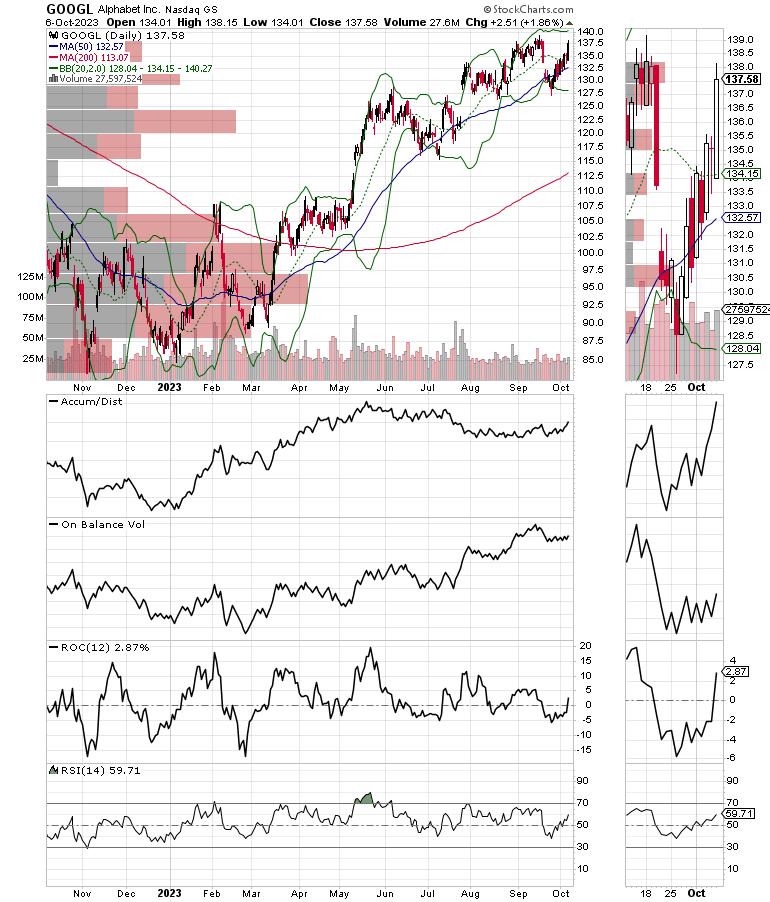
A perfect example of the quiet flow of smart money can be seen in shares of Alphabet, which has remained in an uptrend throughout the recent market decline and is now within reach of breaking out.
Bond Yields Are Now Totally Crazy
Much to the chagrin of regular readers, I remain fixated on the action in the bond market. That’s because, if you haven’t noticed, stocks are trading in a direct inverse lock step to bond yields. In other words, rising bond yields lead to falling stock prices and vice-versa. You can thank the robot trader farms for that.
Recently, I’ve noted the U.S. Ten Year Treasury Note (TNX) yield has been trading well above its normal trading range. Specifically, TNX has been above the upper Bollinger Band corresponding to its 200-day moving average since August 11, 2022, except for a small dip back inside the band. As I noted in my recent video on Bollinger Bands, this is a very abnormal trading pattern, which usually precedes a meaningful reversal.

Indeed, something may be happening, and we may be in the early stages of the reversal I’ve been expecting. On 10/6/23, we saw an intraday downturn in TNX after what was initially seen as a bearish jobs report delivered an early rise in yields which took TNX to 4.9%.
The above chart shows that bond yields reached a greater extreme reading recently, as TNX closed three standard deviations above its 200-day moving average on 10/2/23 and 10/6/23 (red line at top of chart), expanding the distortion in the market and likely raising the odds of bond yields reversing their recent climb. Rising bond yields have led to rising mortgage rates and weakness the homebuilder stocks, which as I recently noted to subscribers of JoeDuarteInTheMoneyOptions.com and members of my Buy Me a Coffee page here, may be poised for a rebound.
As the chart below shows, rates (MORTGAGE) have skyrocketed in what looks to be an unsustainable move.
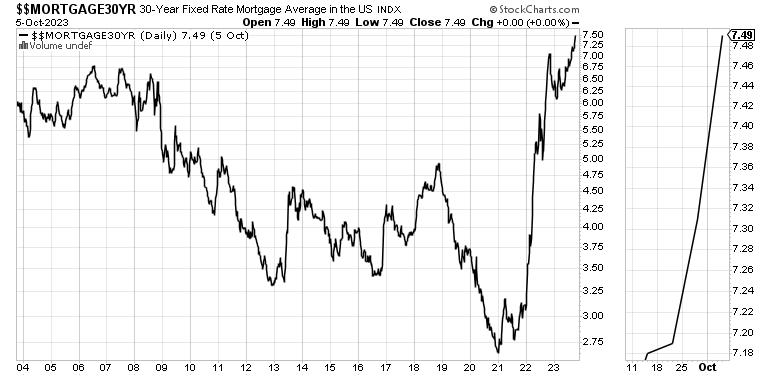
Such a move would be expected to trip a major selloff in the homebuilder stocks. But what we saw was the opposite, as the SPDR S&P Homebuilders ETF (XHB) is starting to put in a bottom as bond yields look set to roll over.
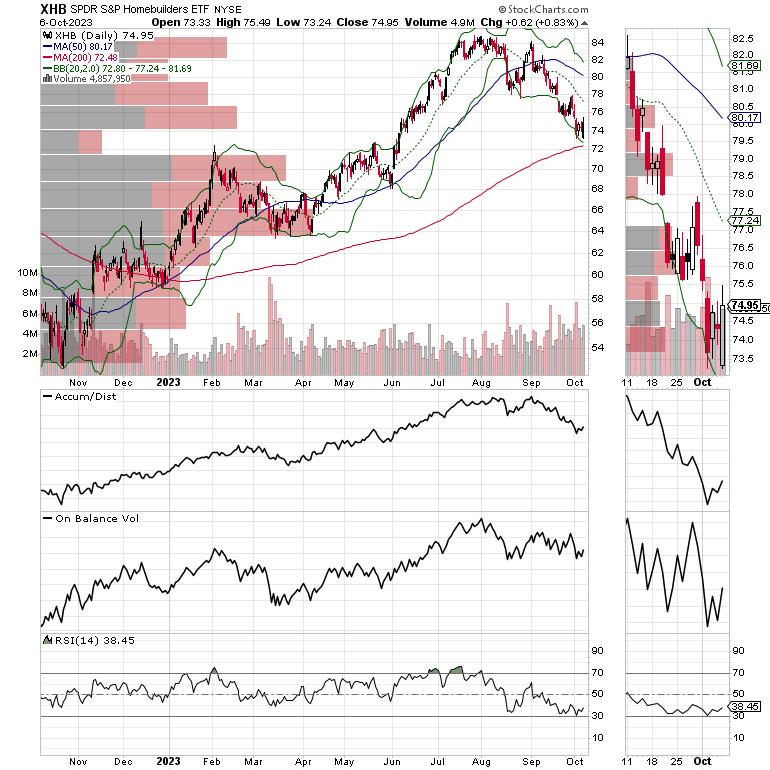
The take-home message is that homebuilder stocks are now marching in lockstep to the tune of the bond market. Once bond yields fully reverse, the odds favor a nice move up in homebuilder stocks.
Prepare for the next phase in the market. Join the smart money at JoeDuarteInTheMoneyOptions.com where I have just added five homebuilder stocks to the model portfolios. You can have a look at my latest recommendations FREE with a two week trial subscription. For frequent updates on real estate and housing, click here.
The Market’s Breadth Shows Signs of Stabilizing
The NYSE Advance Decline line (NYAD) fell below its 200-day moving average last week, but cemented its oversold status based on its most recent RSI reading near 30. Of some comfort is that the fledgling bottom in NYAD is developing near its recent March and May bottoms.
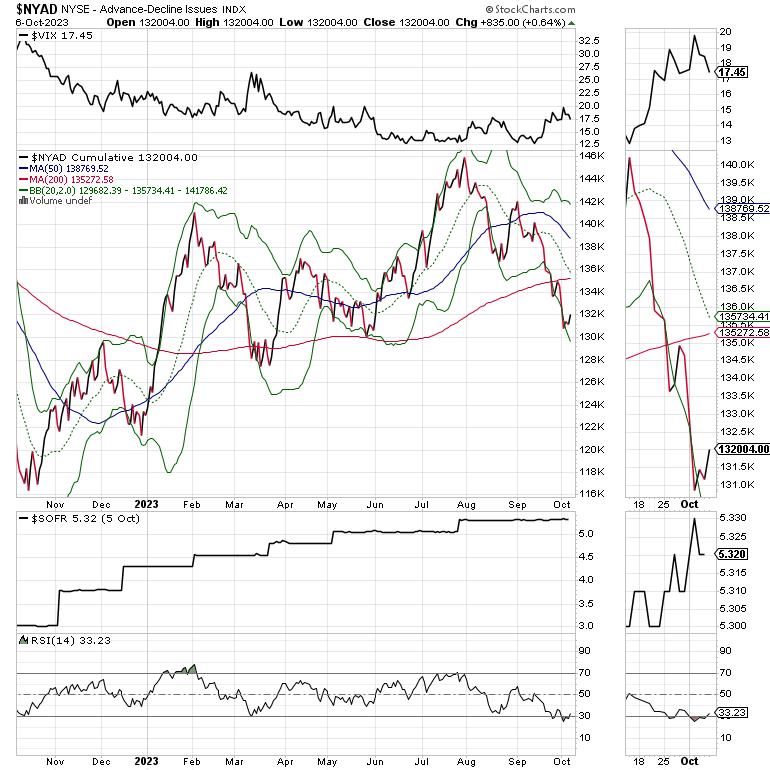
The Nasdaq 100 Index (NDX) has survived multiple tests of the 14500-15000 support area. ADI and OBV are both bouncing, which means short covering (ADI) and buying (OBV) are occurring simultaneously.
The S&P 500 (SPX) found support just below 4250 and looks set to test the resistance levels near the 20 and 50-day moving averages in the near future. ADI is rising as short sellers cover their positions. If OBV turns up, it will be even more bullish.
VIX Remains Below 20
As it has done for the past few weeks during which the market has corrected, VIX has remained stubbornly below the 20 area. A move above 20 would be very negative.
When the VIX rises, stocks tend to fall, as rising put volume is a sign that market makers are selling stock index futures to hedge their put sales to the public. A fall in VIX is bullish, as it means less put option buying, and it eventually leads to call buying, which causes market makers to hedge by buying stock index futures. This raises the odds of higher stock prices.
Liquidity Continues to Tighten
Liquidity is tightening. The Secured Overnight Financing Rate (SOFR), is an approximate sign of the market’s liquidity. It remains near its recent high in response to the Fed’s move and the rise in bond yields. A move below 5.0 would be bullish. A move above 5.5% would signal that monetary conditions are tightening beyond the Fed’s intentions, which would be very bearish.
To get the latest information on options trading, check out Options Trading for Dummies, now in its 4th Edition—Get Your Copy Now! Now also available in Audible audiobook format!
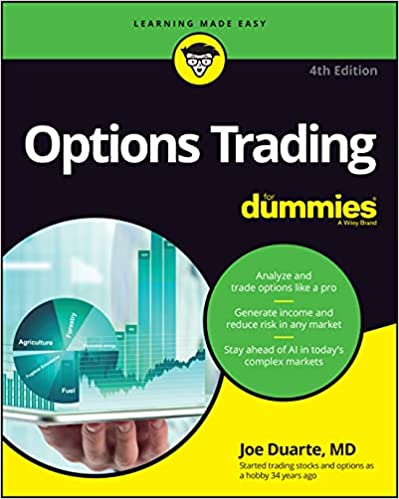 #1 New Release on Options Trading!
#1 New Release on Options Trading!
Good news! I’ve made my NYAD-Complexity – Chaos chart (featured on my YD5 videos) and a few other favorites public. You can find them here.
Joe Duarte
In The Money Options
Joe Duarte is a former money manager, an active trader, and a widely recognized independent stock market analyst since 1987. He is author of eight investment books, including the best-selling Trading Options for Dummies, rated a TOP Options Book for 2018 by Benzinga.com and now in its third edition, plus The Everything Investing in Your 20s and 30s Book and six other trading books.
The Everything Investing in Your 20s and 30s Book is available at Amazon and Barnes and Noble. It has also been recommended as a Washington Post Color of Money Book of the Month.
To receive Joe’s exclusive stock, option and ETF recommendations, in your mailbox every week visit https://joeduarteinthemoneyoptions.com/secure/order_email.asp.


Comments are closed.